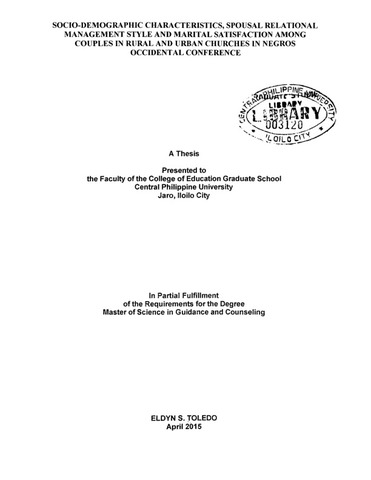Socio-demographic characteristics, spousal relational management style and marital satisfaction among couples in rural and urban churches in Negros Occidental conference

Page views
1,452Date
2015Author
Thesis Adviser
Defense Panel Chair
Share
Metadata
Show full item record
Abstract
Marital satisfaction is the subjective perception of support in satisfying the dominant needs of each spouse. It is the dream and goal of every couple to live harmoniously with his/her partner.
The atmosphere that exists between spouses is the major factor that would influence the kind of families the children are going to form later in life. Family is the basic unit of the society. Harmony in the society is dependent upon the relationships that exist between couples in the community.
This study aimed to the determine socio-demographic characteristics, spousal relational management style and marital satisfaction among couples in rural and urban churches in Negros Occidental Conference. Specifically, this study aimed to: 1. describe the sociodemographic characteristics of the respondents in term of age, educational attainment, employment status, family income, length of marriage, number of children religion and type of residence; (2) determine the spousal relational management style of the respondents’ (3) determine the marital satisfaction of the couples according to their needs; (4) determine if there is a significant relationship between the socio-demographic characteristics of the respondents and their spousal relational management style; (5) determine if there is a significant relationship between the socio-demographic of the respondents and marital satisfaction; (6) determine if there is a significant relationship between the respondents’ spousal relational management style and their marital satisfaction.
This is a descriptive relational study that utilized the one-shot survey design. The respondents of the study were 136 church members from rural and urban churches with at least 10 couples’ membership. The instrument used in the study was a self-made for the socio-demographic characteristics of the respondents. The spousal relational management style questionnaire was adopted and modified from the work of Armand T. Fabella while the marital satisfaction was adopted and modified from the research work of Yane Walakuow. The instrument was subjected to content validation by five experts. The instrument was piloted to ten separate couples and found out to reliable at .82 Cronbach’s alpha. Frequency counts, percentages, Chi-Square and Gamma were the statistical tools employed to analyze the gathered raw data.
Result of this study revealed that majority of the respondents were 41 years old and above. Most of them were highly educated and were self-employed. Common in the cohort had a monthly family income of P 20001 and above. Majority of the respondents were female and a large portion of the group were homogeneous Adventist who were residing in urban areas.
Further, the study revealed that in the domain of lead -spousal relational management style, the majority of the respondents always displayed the connecting habits of trusting, encouraging, negotiating, supporting and caring. Moreover, husbands displayed connecting habits of encouraging, negotiating, and caring, while the wives dominantly manifested the leading habits such as: trusting, encouraging, supporting, and negotiating. The boss- spousal relational management style behaviors that always practiced by majority of the respondents were threatening, penalizing, bribing commanding. Among the husbands the dominant disconnecting habits were the following: threatening, bribing and penalizing while among the wives are the following threatening, bribing, and penalizing, commanding, bribing and complaining. The overall type of the management style of the participants was lead- spousal management.
Moreover, the majority of the respondents were very satisfied with their sexual need and honesty and openness, but they were less satisfied with recreational companionship, affection, physical attraction and family commitment.
There is a pattern of relationship exists between age and spousal relational management style of the respondents. However, there is no significant relationship that exists among socio-demographic characteristics such as educational attainment, employment status, family income, length of marriage, number of children, religion type of residence and spousal relational management style.
There is a significant relationship between type of residence and marital satisfaction. However, there was no discernable pattern of relationship observed between age, educational attainment, employment status, family income, length of marriage, number of children and religion. Moreover, there is a significant relationship between spousal relational management style and marital satisfaction.
Description
Abstract only
Suggested Citation
Toledo, E. S. (2015). Socio-demographic characteristics, spousal relational management style and marital satisfaction among couples in rural and urban churches in Negros Occidental conference (Unpublished Master’s thesis). Central Philippine University, Jaro, Iloilo City.
Type
ThesisSubject(s)
Keywords
Department
School of Graduate StudiesDegree
Master of Science in Guidance and CounselingShelf Location
GSL Theses 371.4072 T575
Physical Description
175 leaves

